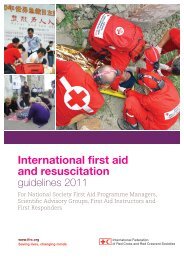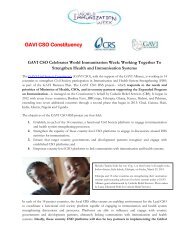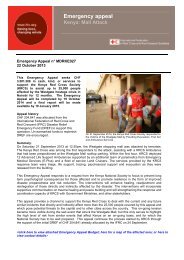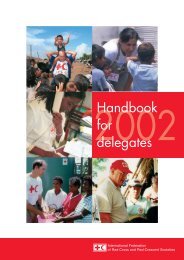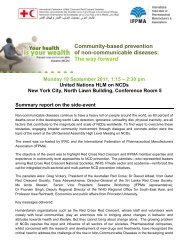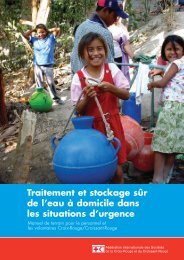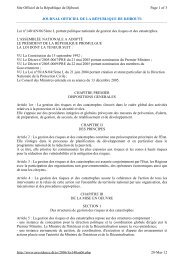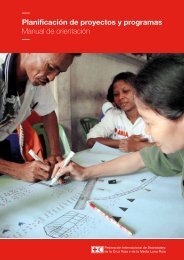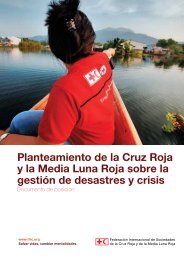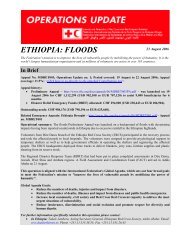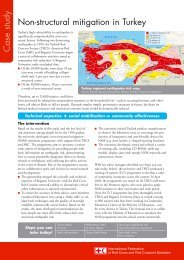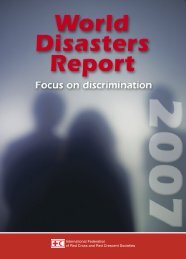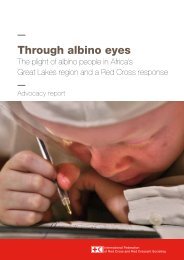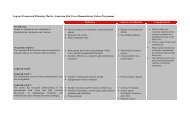World Disasters Report 2010 - International Federation of Red Cross ...
World Disasters Report 2010 - International Federation of Red Cross ...
World Disasters Report 2010 - International Federation of Red Cross ...
You also want an ePaper? Increase the reach of your titles
YUMPU automatically turns print PDFs into web optimized ePapers that Google loves.
Inequitable treatment <strong>of</strong> owners<br />
and non-owners. Although housing, land<br />
or property owners (many <strong>of</strong> whom may have<br />
forms <strong>of</strong> HLP insurance protection) and tenants<br />
and other non-owners are equally affected by<br />
disaster, frequently the latter groups face inequitable<br />
treatment within the HLP sector. Following<br />
the Pisco earthquake, 78 per cent <strong>of</strong> the population<br />
that had title received grants for reconstruction,<br />
while tenants and informal dwellers<br />
generally did not. The same distinctions were<br />
made after the 1995 Kobe earthquake in<br />
Japan, where owners were invariably entitled<br />
to return to their pre-quake homes, whereas tenants<br />
were <strong>of</strong>ten forced to find new housing as<br />
their former neighbourhoods were transformed<br />
into new and more expensive areas. After<br />
Hurricane Katrina, relatively small amounts <strong>of</strong><br />
financial assistance were provided to rebuild<br />
rental units compared to the considerable sums<br />
provided to owner-occupiers to rebuild.<br />
HLP disputes and secondary occupation.<br />
HLP disputes generated by the<br />
secondary occupation <strong>of</strong> homes and lands<br />
are commonplace following disasters. Such<br />
disputes can occur between many different<br />
parties, such as two poor families struggling<br />
over access to a single piece <strong>of</strong> land. More<br />
ominously, disputes between poor communities<br />
and private sector interests, which seek to<br />
control the disputed land for development purposes,<br />
can seriously undermine broader postdisaster<br />
recovery efforts and cause forced and<br />
arbitrary evictions.<br />
Insecure tenure. Inadequate or insecure<br />
HLP tenure can significantly worsen the HLP<br />
prospects <strong>of</strong> disaster-affected populations, as<br />
well as creating considerable challenges for<br />
shelter providers in the aftermath <strong>of</strong> disasters.<br />
Tenure insecurity – or the reduced degree <strong>of</strong><br />
protection against eviction and other threats –<br />
can arise through a wide range <strong>of</strong> pre-existing<br />
CHAPTER 3<br />
66<br />
or post-disaster circumstances. These can relate<br />
to structural weaknesses <strong>of</strong> the HLP rights registration<br />
and record-keeping systems in countries<br />
affected by disaster, a lack <strong>of</strong> clarity between<br />
customary and formal HLP rights frameworks,<br />
systemic bias against non-owners (resulting<br />
in far lesser tenure protection) and the loss,<br />
damage or manipulation <strong>of</strong> land registers and<br />
other methods <strong>of</strong> recording HLP rights. Insecure<br />
tenure can make people reluctant to flee from<br />
their homes and lands when disaster strikes for<br />
fear <strong>of</strong> losing access to them after the event.<br />
In the specific context <strong>of</strong> HLP rights and<br />
disaster, the ‘do no harm’ principle should<br />
mean that humanitarian actors only support<br />
local or national HLP laws and policies that<br />
are consistent with internationally protected<br />
HLP rights. <strong>International</strong> agencies should build<br />
these perspectives into their overall activities<br />
to ensure the broad promotion and protection<br />
<strong>of</strong> HLP rights. It should also mean that humanitarian<br />
institutions consciously ensure that they<br />
are not complicit in any approaches to HLP<br />
issues pursued by national and local governments<br />
that are contrary to international rules<br />
and regulations. In effect, such an approach<br />
would prioritize rights over expediency, strive<br />
to remove the pro-ownership bias that still dominates<br />
many shelter efforts and develop new<br />
internal and external mechanisms to continually<br />
strengthen HLP rights issues in the context<br />
<strong>of</strong> shelter programming. Five key principles are<br />
worthy <strong>of</strong> consideration in this respect:<br />
�� Expand beneficiary participation in HLP<br />
processes and decision-making<br />
�� Define ‘building back better’ as ‘lands for<br />
the landless and homes for the homeless’<br />
�� Treat owners, tenants and informal dwellers<br />
equally by emphasizing security <strong>of</strong> tenure<br />
�� Oppose openly arbitrariness and disasterdriven<br />
land grabs<br />
�� Prioritize restitution first. �



